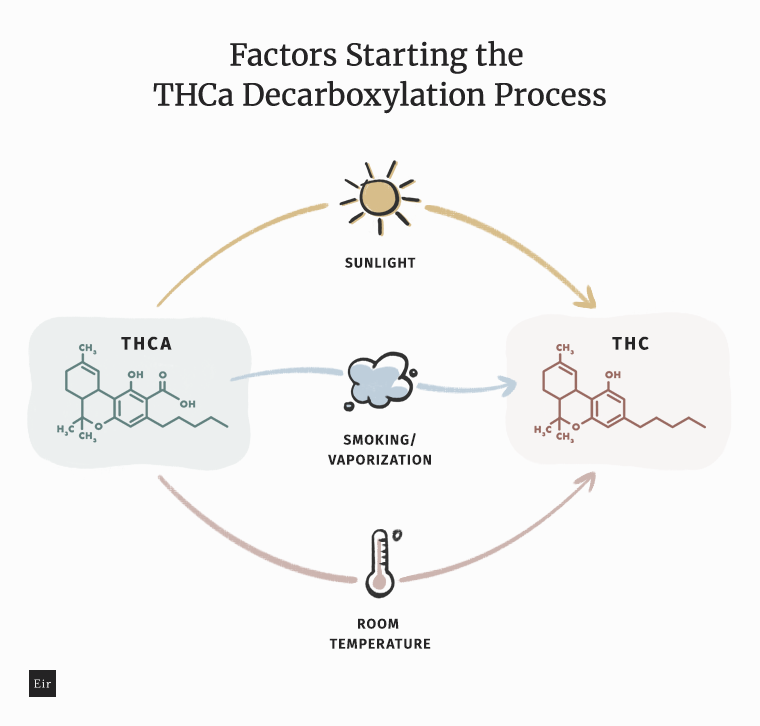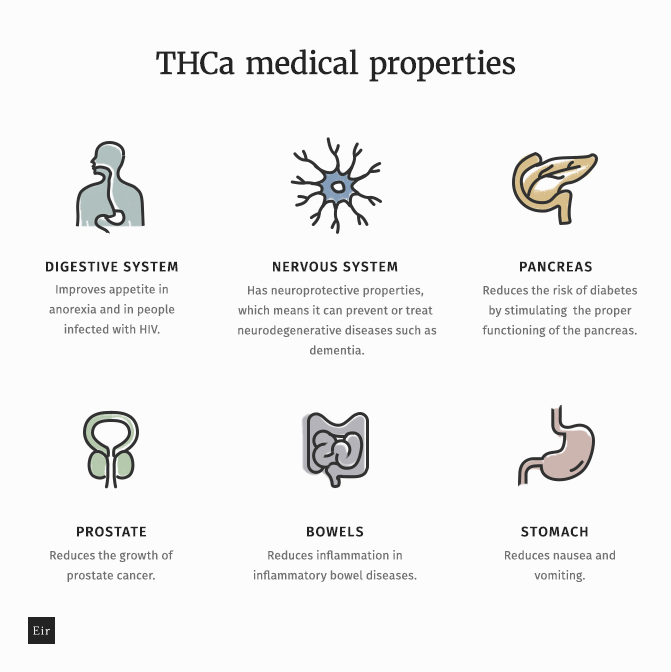
WHAT IS THCA?
THCA - WHAT IT IS?
THCa, like all acid forms, is mainly just a prelude to the cannabinoid form we know so well. Tetrahydrocannabinolic acid is the most common compound in cannabis. It occurs prior to the cannabis plant’s exposure to high temperatures. When cannabis is burned, evaporated, or boiled it enters a process called decarboxylation, which converts non-intoxicating THCa into intoxicating THC.
THE THCA DECARBOXYLATION PROCESS
THCa turns into THC only during the decarboxylation process - the release of the carboxylic group CO₂ from the chemical formula chain. This process is extremely effective at temperatures above 100°C. However, THCa is a thermally unstable substance and the decarboxylation reaction can be initiated by many factors, which include:

- Conversion in sunlight: THCa can transform into THC as a result of exposure to sunlight while the plant is still growing. If the cannabis plant is in the warm sun for a long time, its THCa molecules will slowly transform into THC.
- Smoking/vaporization: if the dried bud of the plant is exposed to high temperature for a short time, many of the existing THCa molecules can quickly turn into THC. This process will not effect the total disappearance of THCa molecules, rather it will only reduce its percentage in hemp.
- Conversion at room temperature: tetrahydrocannabinolic acid can also convert to THC when stored at room temperature for a sufficiently long time. Over time, dried cannabis stored at room temperature in very low light will convert about 20% THCa into THC.
THC AND THCA
As mentioned earlier, THCa is an acid precursor to the psychoactive effects of THC. So, why is THC intoxicating and THCa not? The reason is the three-dimensionality of the THCa molecule. It is basically larger than THC molecules, which explains why it does not fit the cannabinoid receptors in the human body, especially the CB1 receptors which are responsible for the feeling of intoxication.
However, the difference between THC and THCa is largely nominal - they are almost identical in molecular terms, even if they have a fundamentally different effect on the human body and brain.
THCA ACTION
BENEFITS OF TAKING THCA
While most studies on THCa are still in their infancy, there are several interesting discoveries that signal some of the therapeutic properties of this substance:
- It may have antiproliferative effects because it appears to contribute to reducing prostate cancer growth.
- It reduces inflammation, so it might be able to treat inflammatory bowel disease.
- According to 2012 and 2017 studies, THCa seems to have neuroprotective properties, which means it might be able to prevent or treat neurodegenerative diseases like dementia.
- It reduces nausea and vomiting, which has been confirmed in studies conducted on mice.
In addition, scientists who have researched THCa have reported that other cannabinoids seem to treat seizures and pain more effectively when combined with THCa.
THCa also has anti-inflammatory properties - it helps in the treatment of lupus and inflammation of the joints. There is also evidence of a reduction in the risk of diabetes by stimulating the proper functioning of the pancreas with tetrahydrocannabinolic acid. It also has anti-epileptic and neuroprotective effects - it blocks the development of neurological diseases. THCa also works effectively against anorexia. However, the most important advantage of this cannabinoid seems to be that you can use its medical properties without any feeling of intoxication, which for many people struggling with any of these conditions is crucial.

Unfortunately, a lot of the studies on THCA were conducted on tissue samples and animal subjects. Therefore, you cannot currently be completely sure about the medicinal properties of this compound. Only research on the human body can give 100% certainty about the benefits of managing tetrahydrocannabinolic acid. However, as you can see, this review of studies confirms the huge pharmacological potential of THCa.
HOW DO YOU TAKE THCA?
Any high-THC strain will contain THCa before it is decarboxylated. In other words, THCa cannot be heat treated because it will turn into THC. To get the best out of THC, it is, therefore, worth taking a little trouble and getting a fresh bud of hemp directly from the plant, because the drying process also leads to a decarboxylation reaction.
However, as more research is done to better understand THC, more and more often in the context of taking this substance, tinctures and pills containing isolated THCa are mentioned.















